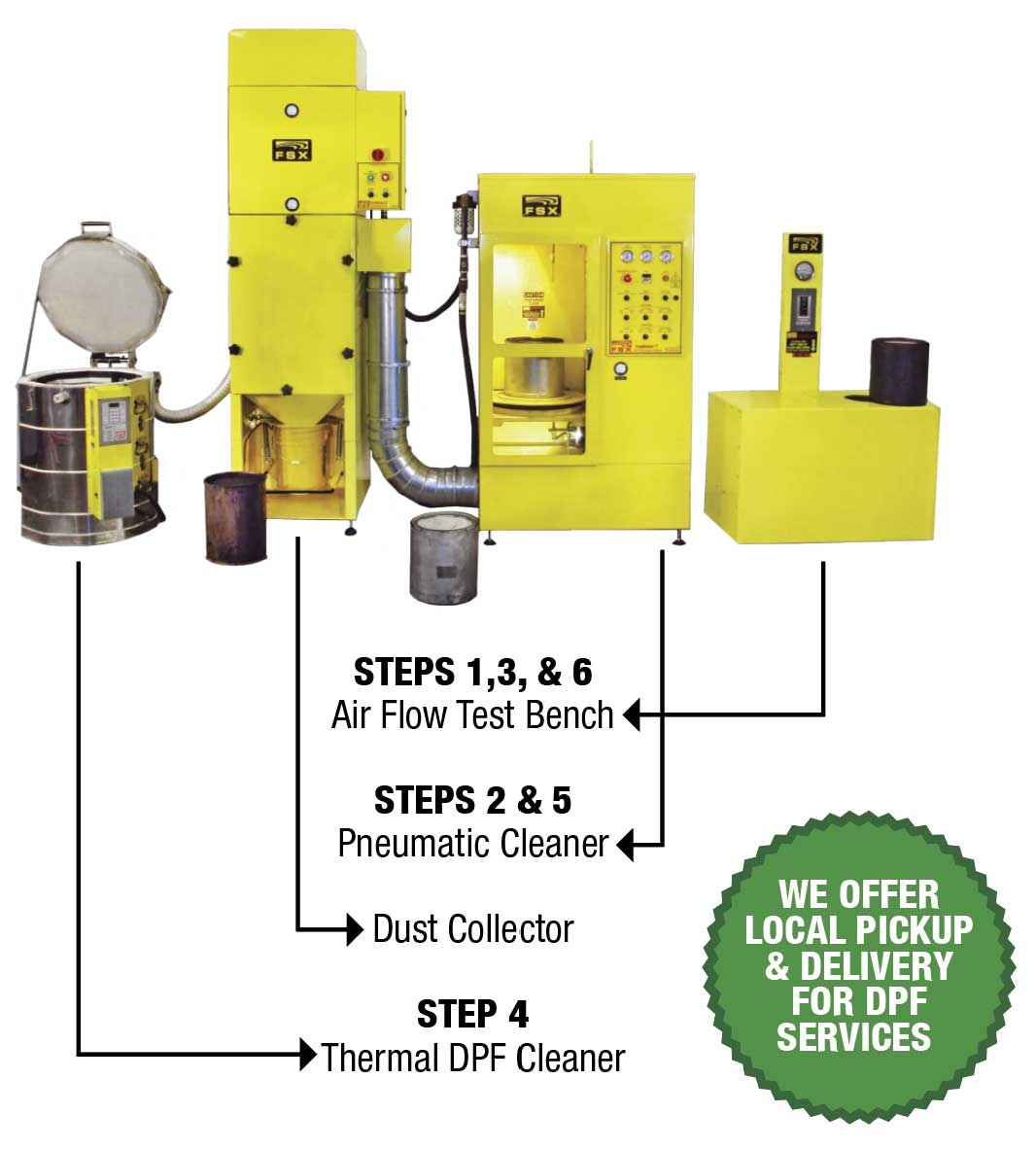M-F: 8am to 5pm / 1 Seidel Ct. Bolingbrook, IL

Diesel Particulate Filter (DPF) Cleaning
For a fraction of the cost of a new DPF filter Diesel Service Center can maximize the life of the one you own. We’re the specialists in DPF cleaning and retrofits.
Fast Turnaround Time & Highly Cost Effective Using OEM Specified DPF Cleaning Equipment
DPF Cleaning Same Day Turnaround
Includes Stage 1
DPF Cleaning Next Day Turnaround
Includes Stage 1 & 2 and DOC

Our DPF Cleaning Process
What is a Diesel Particulate Filter (DPF)?
A diesel particulate filter (DPF) is an emissions control device in the exhaust system of a diesel engine. Its primary purpose is to capture and remove soot or particulate matter (PM) that is produced during the combustion process in diesel engines.
The DPF works by trapping the soot as exhaust gases pass through it. Over time, the trapped particles accumulate, and when the filter reaches a certain capacity, the engine’s computer initiates a process called regeneration. During regeneration, the DPF heats up to a high temperature, burning off the trapped soot and converting it into ash. This process helps to keep the DPF clean and maintain its efficiency in trapping particulate matter.
DPFs are crucial for meeting emissions standards, as they significantly reduce harmful particulate emissions from diesel vehicles, contributing to cleaner air quality.
What are the advantages of cleaning a Diesel Particulate Filter (DPF)?
Cleaning a diesel particulate filter (DPF) offers several advantages, especially for vehicles or systems that have accumulated soot and particulate matter over time. Some benefits of cleaning a DPF include:
- Restored Performance: Cleaning a clogged DPF can improve engine performance. A clogged filter can cause reduced power, decreased fuel efficiency, and even engine issues. Cleaning restores proper airflow, allowing the engine to function optimally.
- Extended DPF Life: Regular cleaning helps extend the lifespan of the DPF. Soot buildup can lead to excessive stress on the filter, potentially causing damage. Cleaning prevents this and maintains the filter’s effectiveness.
- Emissions Reduction: A clean DPF ensures that the emissions control system functions efficiently, reducing harmful particulate emissions from the vehicle. This is crucial for complying with emissions regulations and improving air quality.
- Fuel Efficiency: A clean DPF facilitates better fuel combustion, leading to improved fuel efficiency. Reduced backpressure allows the engine to operate more efficiently, potentially saving fuel.
- Cost Savings: Cleaning a DPF is generally more cost-effective than replacing it entirely. Regular maintenance and cleaning can prevent costly repairs or replacements down the line.
- Improved Reliability: Clean filters contribute to the overall reliability of the vehicle. By preventing issues related to a clogged DPF, such as engine misfires or reduced power, it ensures smoother operation and fewer breakdowns.
Regular maintenance and cleaning of the DPF are crucial to reaping these advantages. It’s often recommended to follow manufacturer guidelines or seek professional advice to determine the appropriate cleaning intervals and methods for a specific DPF system.
What is a DPF Retrofit?
A diesel particulate filter (DPF) retrofit refers to the installation of a DPF system on a diesel vehicle that was not originally equipped with one or has an inadequate emissions control system. This process involves adding a DPF to the exhaust system of the vehicle to reduce particulate matter emissions, making it compliant with stricter emissions regulations.
Retrofitting a DPF to an older diesel vehicle can be a way to improve its environmental performance and ensure it meets current emissions standards. It involves selecting the appropriate DPF system compatible with the vehicle’s engine and exhaust system, followed by professional installation to integrate it effectively.
However, it’s essential to ensure that the retrofitting process is done properly and with approved components to avoid potential issues. Some considerations include compatibility with the vehicle’s engine, proper installation to maintain optimal performance, and adherence to local regulations and emissions standards.
Many regions have specific guidelines and regulations governing DPF retrofits to ensure they are carried out safely, effectively, and in compliance with environmental standards. Consulting with experts or professionals familiar with retrofitting DPFs can help ensure a successful and lawful installation.
